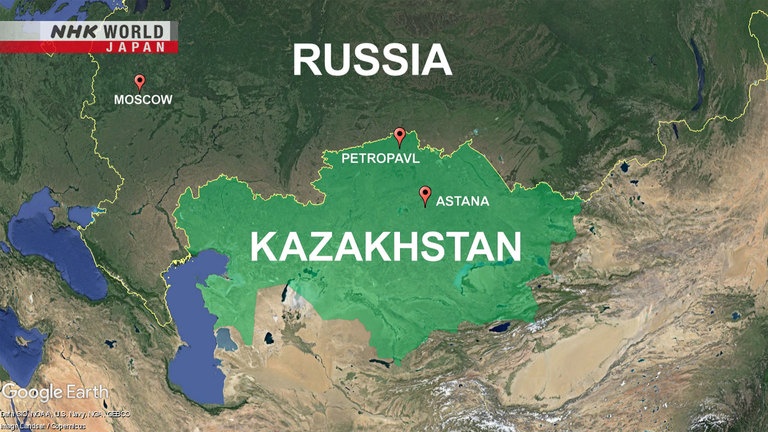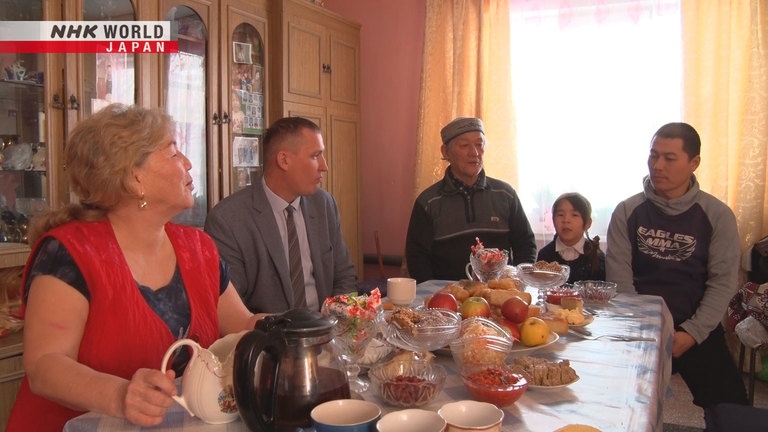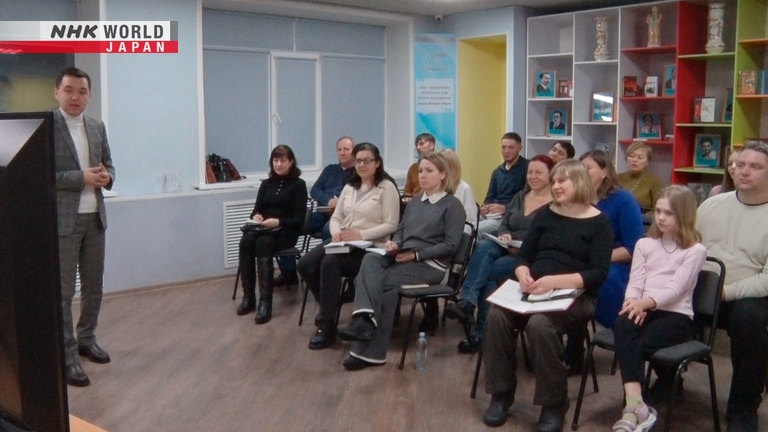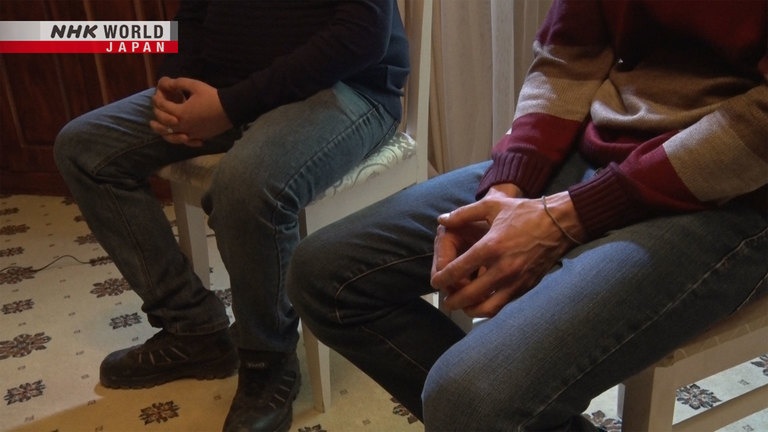Unease Along the Border: Kazakhstan
Northern Kazakhstan borders Russia and has historically been home to many ethnic Russians. However, a recent rise in Kazakh migrants to the region has led to deepening tensions between the two groups.




Transcript
Kazakhstan lies in central Asia.
While the name means 'land of the Kazakh people,'
it's a diverse nation, with some 130 different ethnic groups spread across different regions.
An eight-hour train ride from capital Astana.
Petropavl is the country's northernmost city.
Built as a fortress for the Russian empire during the 1700s, it's named after the Christian saints Petro and Pavlo - Peter and Paul.
During the Soviet era, many people moved to the city from Russia.
There are still many locals who primarily speak Russian.
Of the city's 220,000 residents, 30% are ethnic Kazakhs - primarily Muslim - and 50% are of Russian descent.
But the last few years have seen a rise in Kazakhs moving to the city, changing the demographic balance.
In 2023, a group primarily made up of ethnic Russian citizens made a push for independence from Kazakhstan.
"Major news of a criminal investigation."
"The law against separatist propaganda
was violated in north Kazakhstan."
The incident shocked the nation, and the group was immediately arrested.
The Assembly of People of Kazakhstan, an ethnic collaboration group that reports to the president, had to make an emergency statement.
We are different, but our unity is in diversity.
We will never deviate from this principle.
Kazakhstan shares around 7,000 kilometers of its borders with Russia.
Many northern areas have more Russian than Kazakh residents.
After achieving independence from the USSR,
Kazakhstan made inter-ethnic collaboration its biggest goal.
But there are small ripples becoming visible on the street.
"It was only one person, and
he wasn't too aggressive about it."
"But he insisted that those who
live here should speak Kazakh."
Small cracks in inter-ethnic collaboration are causing tremors in northern Kazakhstan.
Chistoe is a village near the Russian border.
The name means 'Clean,' and it's home to just over a hundred people.
The local elementary school is no longer open.
35 years ago, when this area was under Soviet rule, it looked very different.
The school was filled with hundreds of children.
The village was home to a major state-owned Soviet farm.
With over 800 residents, many of them Russian, it was a bustling locale.
Valentina worked for the village council.
She still uses her Soviet-era tableware.
"This coffee set was from my mother.
These from my in-laws."
"On the birth of my son.
Wineglasses for my daughter."
"I offered them to my kids but tastes change."
"They'd rather buy their own."
Both her children now work in Petropavl.
Today, Valentina lives with her husband.
The state-owned farm closed after the collapse of the USSR.
Most of the village residents lost their jobs.
"We worked hard to survive here.
Some have left to make ends meet."
"Some went to Russia, or to Petropavl."
"Our village is a clean,
beautiful, and kind place."
"We want the village to be revived."
Today, there is a company farming wheat and beans here.
But depopulation hasn't slowed.
Meanwhile, another village has seen its population increase by a factor of four in the last 15 years.
Bayterek is just outside of Petropavl.
It was once a small village of just 400 people.
In 2009, Bayterek saw the arrival of a new community.
Resident numbers have grown steadily, and now top 1700.
One resident moved here from neighboring Kyrgyzstan: Habiba Abdrahmanova.
"My sister moved to an area
just outside Petropavl in 2003."
"She told me there was a program."
"If I moved here, Kazakhstan would
give me work and a home."
Abdrahmanova's family is of Kazakh descent,
so she applied to the program in 2010 and took Kazakhstan nationality.
Since gaining independence from the USSR,
Kazakhstan has adopted a policy of reaching out to ethnic Kazakhs in neighboring countries like Russia, Mongolia, and China.
The village homes were built using national funds.
At around eight US dollars a month, the rent is extremely low.
After a number of years, residents can own their homes through a government-backed loan program.
The stream of newcomers has helped the village grow.
It now has a school big enough for over 300 students.
Bayterek is a Kazakh name that means 'tree of life.'
The tree is a national symbol that towers over the capital, Astana.
"If North Kazakhstan becomes
60-70% Kazakh, that's good for us."
"We're on the Russian border."
"I think it's right to ensure the folks
living here are Kazakh."
The demographic balance of Kazakhstan has long shaped its immigration policies.
Under the USSR, many Russians moved to Kazakhstan to work in farming.
Towards the end of Soviet rule,
Russians outnumbered Kazakhs in many regions - a situation which has continued long after the collapse.
The northern part of the country even saw an ethnic-Russian-led movement calling for self-government during the 1990s.
Kazakhstan's first president, Nazarbayev, focused on inter-ethnic collaboration, with an eye to Russian residents.
At the same time, he also promoted immigration policies to shift the demographic balance.
As a result, Kazakhs now outnumber Russians in most regions that aren't along the northern border.
In 2017, the government announced a new policy promoting domestic migration to the north to solve a labor shortage.
"They helped with moving expenses
and found us housing."
"Local government gave
my husband and me work."
"Now we have our own business.
We raise sheep and horses."
"It's a good life. We're all very happy."
"We told our relatives and
two other families have moved."
"Migrants are given financial aid,
with rent and utilities reimbursed."
"We support them in finding new jobs
or setting up their own business."
Volunteers are being sought in crowded southern regions where the Kazakh population is already high.
Some 30,000 people migrated north over the first 5 years of the program.
This family of five moved to the village of Voskresenovka from Shymkent in the south.
They're visited by the village mayor, who is Russian.
Since most of the village is Russian, he wants to ensure there's no friction between the groups.
"I want to know how they find it here.
I want to help as much as possible."
"I love it here.
I feel like it's really home."
"The climate is wonderful
and I love the people too."
The shift in demographic balance has also changed the local landscape.
A new, large mosque has been built in Petropavl.
Famous Russian poet Pushkin stands alongside the popular Kazakh poet Abai.
Two heroes immortalized as statues.
Many residents are particularly interested in the issue of changing the city's name.
After independence, many Soviet-era names were changed,
and politicians have often discussed the idea for Petropavl.
The name was initially changed from Petropavlovsk, to reduce Russian influence.
There is now discussion about changing it to Kyzylzhar, a Kazakh name.
"I'm against it. Pointless."
"I'm happy to go with the majority."
"I like Kyzylzhar.
I liked Petropavlovsk too."
"I don't really get it. I don't
want major changes like this."
The Russian majority are largely against the idea.
Meanwhile, some Kazakh groups are taking extreme actions to promote the change.
In an effort to calm the situation, the mayor of Petropavl publicly announced that the issue was not on the agenda.
Small changes are appearing in everyday life.
"Most people here speak Russian
In the south it's mainly Kazakh."
"It was only one person, and
he wasn't too aggressive about it."
"But he insisted that those who
live here should speak Kazakh."
Over the last few years, some Kazakhs have begun carrying out so-called 'language patrols.'
At stores and government offices,
they insist staff speak to them in Kazakh instead of Russian, even though Russian is an official language.
"I want to be spoken to in Kazakh,
our national language."
"I repeat:
I will not continue this conversation."
"Not speaking Kazakh is
disrespectful to our nation."
"That is not an appropriate way
to speak to a stranger."
"You're at work.
Speak the national language."
President Tokayev has expressed concern over the rise in these 'language patrols.'
"Our citizens' rights must not be
violated over language or ethnicity."
"It leads to conflict."
"Do not permit these 'language patrols.'"
Meanwhile, some Russian citizens are learning the Kazakh language.
The youth faction of the ruling party began holding free Kazakh classes in 2023.
Despite being aimed at young students, a surprising number of older people asked to take the lessons.
This programmer is studying with his wife and child.
"It's useful for communicating
at work and in daily life."
"Many people I know
are taking this course."
"As this region is on the Russian border
many people speak Russian."
"We started this project to increase
the number of Kazakh speakers."
"We live in Kazakhstan, after all."
Over five thousand people move to the North Kazakhstan region each year.
But while Kazakh and other populations have grown since the domestic migrant policy began in 2017,
the Russian population has fallen by 40,000.
The government insists that it offers equal support to all.
"We have a saying:"
"Fish look for deeper waters.
People look for greener pastures."
"Young folks go to big Kazakh cities
to find better opportunities."
But most ethnic Russians are moving to Russia rather than other Kazakh cities.
Some large Russian cities are closer than Kazakhstan's capital, Astana.
Kazakh citizens can also move to Russia and work there without a passport.
Andrey Issakov runs a successful chain of local supermarkets in Petropavl.
He says the flow of people leaving for Russia is unavoidable.
"The thing is, wages in our region
are not very high."
"People will look to see where
they're needed, and move there."
Wages in the North Kazakhstan region average around 500 dollars a month, the lowest in the country.
Yet rent is high and growing, and home ownership is out of the realm of possibility for many.
Industry hasn't developed in the north, and the region is becoming more and more economically reliant on Russia.
Isakov's stores are popular with customers because they stock a wide range of quality items.
But he's dependent on Russian products.
The EAC mark is the symbol of the Eurasian Economic Union,
which allows free trade of recognized products between five countries, including Russia and Kazakhstan.
"We're next door to Russia."
"It's a huge, developed country.
We're very dependent on it."
"Historically we have maintained good,
friendly relations with Russia."
"We have no other choice."
Since independence, Kazakhstan has deepened its ties with Russia, with both economic and military alliances.
Yet the country has not recognized Russia's annexation of the Crimea or Donbas.
It also does not support the war in Ukraine.
This has caused some complex feelings among ethnic Russians in Kazakhstan.
"That war began because nationalists
were oppressing Russian residents."
"War is terrifying.
I want to stay neutral."
"I'm grateful to Putin.
He's in the right. God bless him."
Petropavl-based Kazakh journalist Aijana Shaikenova writes articles for online media.
She feels that the atmosphere in the north is different from other regions.
"I visit Astana and Almaty regularly."
"There's strong condemnation of
the Ukraine invasion in those places."
"But it's not criticized here as much."
"People are more passive,
or disinterested in the topic."
"They don't see the problem with
an aggressive neighbor."
"I can't say that all Russians
support the war."
"Of course they don't.
Many people are against war."
"This is not about ethnicity, but a
long history of Russian TV propaganda."
"Propaganda has a very strong influence."
This was the situation which led to the separatist push for independence in 2023.
Of the 19 members of the independence group, four were arrested.
The leader was sentenced to nine years in prison.
Ekaterina Nazarenko is the chief editor of Petropavlovsk News, a local, independent, Russian-language news site.
She was deeply shocked by the incident.
"It's all just talk now, but
they were activists, and prepared."
"Somebody could fund them tomorrow,
control them, and urge action."
"We might see clashes between
Russians and Kazakhs."
"We must ensure these small groups
don't get any bigger."
Her concerns are heightened by daily comments on articles.
They reveal the thoughts people don't express out loud.
These comments were left on an article about the government policy to move 10,000 people to the north over the next five years.
Migration from the south doesn't solve anything.
If anything, it makes things worse.
1. It wastes money.
2. A shocking number are badly educated.
Kazakhs have never liked the northern region.
If there was work and balanced profits for all people
instead of this focus on increasing Kazakhs,
the population would be stable.
One of Nazarenko's daily tasks is going through each comment and making deletions.
"They don't say it openly but
their true goal is 'Kazakhization.'"
"This is a dangerous comment."
Even if the article itself is acceptable,
if the authorities decide the site 'incites inter-ethnic conflict,' it will have to be closed down.
Nazarenko has already been called in for questioning by the police several times.
"I have to be so careful.
It's frightening."
"Why do we write so little about
these contentious topics?"
"Because we'll win the attention
of someone who might not like it."
These crackdowns leverage a law called Article 174,
which prohibits the inciting of hatred between different groups.
Article 174. Inciting social, national, tribal,
racial, class or religious hatred.
The law was revised in 2015 and now applies to online media, including individual journalists and bloggers.
If convicted, members of organizations can be imprisoned for up to 20 years, and individuals for up to seven years.
However, over the last few years, there's been a rise in private individuals targeted under this law.
This is a popular video chat service for talking to strangers online.
A woman was encouraged by a foreign man to complain about her experiences of 'language patrols.'
"Kazakhs are awful, right?"
"They're getting so rude
and proud, like Ukrainians."
"I work in a store and they talk
to me in Kazakh, knowing I'm Russian."
"Glory to Putin!"
"Putin's a handsome man."
The woman was investigated under Article 174 based on this conversation.
Since the revision, around ten sentences have been handed down in North Kazakhstan.
Some say there are major issues with the way the law is being applied.
Lawyer Tolegen Shaikov defended the first Article 174 case after its revision.
"I think the law itself is necessary.
But it must be applied very carefully."
"It should only be used against
those truly calling for ethnic hatred."
"It is dangerous that we have no
explicit rules on what is criminal."
"As a lawyer, I cannot say
what is acceptable to write."
"I do not know what words
are permitted or forbidden."
"Today, people are quieter than before."
"The defensive urge is strong.
It's hard to know what people think."
Kazakhstan or Russia - which country is truly home?
Many ethnic Russians are facing this dilemma.
"I worked in Russia this summer."
"I wanted Russian citizenship.
But not in this current situation."
"My sister's been in Russia 11 years.
I could have gone if I wanted."
"The grass may look greener
over there but it's no paradise."
"In Russia, they'd see me as Kazakh.
That's where we're from, after all."
"We're outsiders wherever we go.
Strangers here and there."
For over 30 years since achieving independence from the USSR, Kazakhstan has cultivated peaceful growth.
In the face of a powerful neighbor to the north, can this peace be maintained?